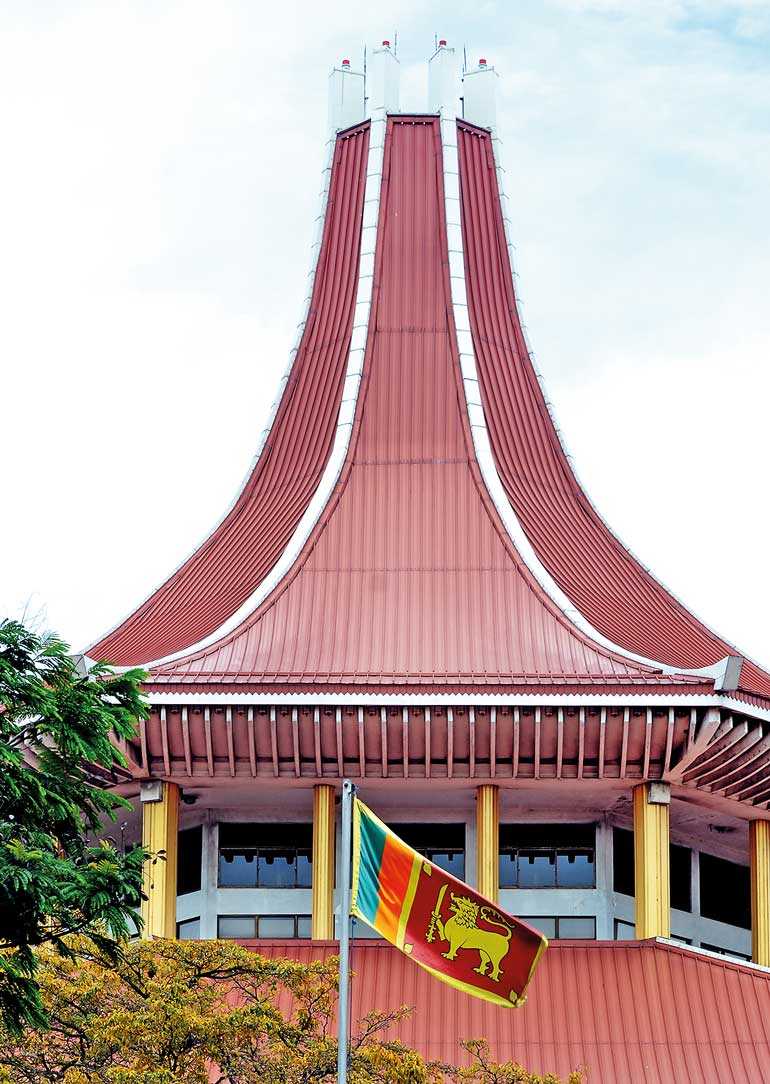Wednesday Feb 18, 2026
Wednesday Feb 18, 2026
Thursday, 31 January 2019 01:16 - - {{hitsCtrl.values.hits}}

This is a very difficult question to answer and it is only the average citizen/litigant who may be capable of answering this million dollar question.
In the West and many other in the Commonwealth and civil law jurisdictions, the judiciary is independent with sufficient checks and balances. But in highly-politicised societies with rampant bribery and corruption, mostly in less-developed countries, this has ripple effects all over the society as a cancer, lowering standards in the lowest ebb; it is not a breeding ground to maintain such standards.
Barometer of democracy
Independence of the judiciary is the barometer of the computation of the democracy, and culture of a nation expecting justice and fair play for the resolution of their disputes from impartial and politically insulated independent judges appointed under the constitution. It is a good sign that in Sri Lanka the Judiciary today is well-paid, remunerated, protected and looked after, respected, and has gained the confidence of the citizen, maintaining impartiality and trust of the litigants.
Are judges politically insulated and not influenced by media and political influence linked to perks and promotions? Is the mode of selection of judges especially the highest judiciary non-political when the majority of the selecting body is political towards the state when the minor judiciary is selected by the apex judiciary appointed by the politicised apex commission?
Are judges well trained, exposed to the wider world jurisprudence and competent or keep pace with the rest of the jurisdictions and the past we can be proud of? Are they updated with the modern developments in the digital age in par with the rest of the jurisdictions? These are unanswered valid questions.
Are the judgments clear, deep, exhaustive, and maintain the highest standards maintained by the predecessors like traditional judgments respected by the jurists worldwide? Our judges and Judiciary have fortunately passed these litmus tests on world standards, leaving little room to raise standards further, which are worldwide issues.
Ultimate decision over life
Judges should be free to make decisions because they are charged with the ultimate decision over life, properties, rights and duties of the citizen including all kinds of freedoms enshrined in the Constitution and by way of conventions, powers and traditions vested with the executive with great trust to be impartial and should not be undermined overlooked or destroyed. They are the guardians of the supreme law and the citizen.
It is also unfortunate that successive governments and the leaders of the Executive have misused and violated this sacred responsibility entrusted to them as the guardians and temporary trustees of the ‘Temple of Justice,’ which is the backbone of the freedom and equality.
Are judges competent, educated, and trained and temperamentally sound to judge the complicated issues pertaining to individuals, companies and the State and constitutional matters involving the supreme law of the nation?
Supreme Court judges are well paid with a substantial pension to discourage them being employed and engaged in other financial lucrative arenas including political activism after retirement and many improvements are required for our Judiciary to be in par with real world standards.
Trust and faith of the citizen
The judiciary should be acceptable and recognised, for the citizen to have trust or faith; being the branch of government primarily responsible for interpretation. According to UN guidelines and accepted norms of constitutional law under the doctrine of separation of powers are outlined in details in international instruments and conventions, to be followed by the family of nations which trickles down to national laws in democratic models.
A recent famous case on the conduct of a general election is a litmus test on the independence quality and competency of the highest and the judiciary with no further appeal to any other local or world judiciary.
It is also necessary to follow the guidelines in the world judicial arena in Sri Lanka and concepts of good governance in conduct of justice and fair play. It is essential to explore the recent judgments worldwide with new approaches such as concepts of necessity applied worldwide including our neighbours in matters of national importance.
Temperament and qualities of a judge
Judges always command respect and therefore need not demand respect. How do judges show respect? By treating everyone with dignity, by being polite and courteous, by listening carefully to the testimony presented and arguments of counsel, by being patient, and in general showing that the judges genuinely care about the matters being presented, understand that it is an impartial meeting of those involved and convey the attitude that he/she will do the best to decide the case forming objections on the evidence presented and applicable to the law and judges should not be political animals and have any interest in politics, any religion or any activism in any form other than fair and impartial adjudication.
In the United Kingdom and Sri Lanka judges are paid well and well looked after with perks, respect and facilities. Judges should be careful as they are similar to public exhibits in glass boxes! It is unbecoming of a judge to maintain close contacts with the media and politicians however much one is tempted to be in the limelight and likes publicity. A judge should not be a social or religious activist or a centre for public controversies. Judges are human beings and liable to make mistakes.
Highest judiciary should be extra careful
The highest judiciary in any country must be extra careful in their deliberations as it is difficult to challenge the decision of the final court. Compassion, decisiveness, open mindedness, sensitivity, courtesy, and patience, free from bias, and commitment to equal justice are some of the main qualities of a judge with the correct judicial temperament.
The system of judicial independence depends on the citizens’ faith and the trust that judges will decide disputes impartially and fairly free from bias or prejudice. Judges traditionally have been accorded respect from citizens. In return judges must respect all those who include the parties to the dispute, then attorneys, jurors, court reporters, staff and members of public.
Appointments of judges and practices in other jurisdictions
In the USA some judges are elected by the people and in Sri Lanka the judicial power of the people is exercised by the Parliament through courts according to law (Article 4 (c)). First amendment to the USA guarantees the protection and tenure of the judges as in the case of many common law jurisdictions. The judiciary is the third branch of the Government and severely scrutinised by the people and the media.
David Blankette, once the Home Secretary and Secretary of State in the United Kingdom, was compelled to resign in 2004 as a result of the pressure from the media and the activists on matters pertaining to judges and judiciary. Commonwealth countries including UK, India and Sri Lanka follow similar conventions and traditions in the appointments and conduct of the judges and the judiciary, which is one of the main components of democracy.
Courts interpret law
In the common law jurisdictions courts interpret law including constitutional status, laws and regulations. They also make law based upon prior case law in areas where legislature has not made law. We mainly follow English Law in this area and the principles and procedures accepted are from the English and Commonwealth practices. Appointment of judges is clearly laid down in the Constitution, with safeguards and freedom to the Executive to take impartial and correct decisions.
Commissions to be non-political
The nation expects the President and the apex Commission to make the best appointment to be the Judiciary, deciding at crucial and decisive junctures the future of the destiny and future of the subject. The Chief Justice is the head of the Judiciary and under the Constitution, Legislature and conventions entrusted with enormous powers in legal education (vide the article in Daily News on legal education by this author on 29 June 2008 on the subject ‘Law College, Legal Profession, Bar Association and Judicial System’). Disciplinary matters of the judges and lawyers and as the head of the final court of appellate with ultimate and final powers of adjudication and administration of justice.
Time to rethink revisit and readjust
Today the time is ripe to rethink, readjust, and revisit for reforms and the systems with new vision and a new mandate from the citizen waiting for an opportunity for their future decisions which is denied to them due to petty power hungry politicians.
The citizen is the ultimate decision maker and should be given the first available opportunity to decide the wish and will of the people to decide the destiny of the children and the nation they love most.
(“Not by passing arbitrary judgments does a man become wise. A wise man is one who investigates both right and the wrong. He who does not judge others arbitrarily according to the truth, that sagacious man is a guardian of law and is called just. One is not wise because one speaks much. He who is peaceful, friendly and fearless is called wise. A man is not versed in Dhamma because he speaks much. He who, after hearing a little Dhamma, realises its truth directly and is not heedless of it is truly versed in Dhammapada.”)
(The writer is a President’s Counsel, former BASL Secretary and former Ambassador to UAE and Israel. He could be reached via email at [email protected].)